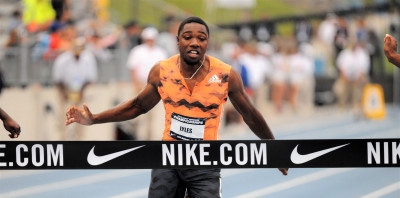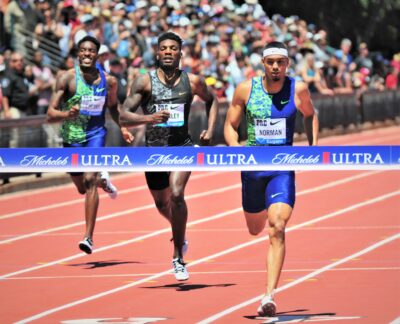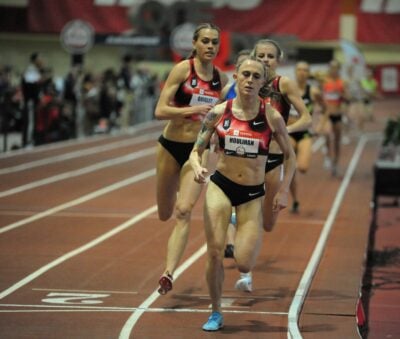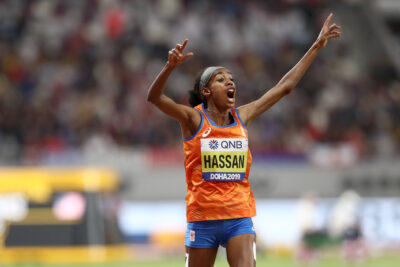What Track and Field Doubles Are Doable At The 2021 Olympics?
Evaluating Each Potential Double at the 2021 Olympics
By LetsRun.com
August 4, 2020
Today marks exactly one year to go until one of the most anticipated finals of the Tokyo Olympics: the men’s 200 meters, which, if everything goes to plan, could feature the United States’ three brightest young sprint stars — Christian Coleman, Michael Norman, and Noah Lyles — battling it out for the title of Olympic champion. With Norman running 9.86 and Shaunae Miller-Uibo running 10.98 for 100 meters last month, the track world began buzzing about potential doubles at the 2021 Olympics for two of the most versatile sprinters in history. But when it comes to sprint doubles at the Olympics, you need two things.
The first is talent. In the last 32 years, only four athletes have won two sprint events at a single Olympics: Usain Bolt, Elaine Thompson, Michael Johnson, and Marie-José Pérec.
The second is a favorable schedule. While the 100/200 double and 5,000/10,000 doubles are almost always doable, other doubles can be tough. Even Johnson needed the IAAF to change the schedule to accommodate his 200/400 double in 1996.
Whether Norman and Miller-Uibo can to win multiple events at the Olympics remains to be seen, but we can evaluate the friendliness of the schedule right now. Below, we take a look at how the Olympic schedule lines up for the “traditional” doubles — and some non-traditional ones as well. Along the way, we propose a few simple solutions that would make many of the doubles much more doable out of the hope that someone at the IOC or World Athletics is paying attention.
The full 2021 Olympic schedule can be found in this spreadsheet we created based off of a Wikipedia entry.
Men’s 100/200
Feasibility: Very good
100: Day 2, 7:45 p.m. (prelim); Day 3, 7:15 p.m. (semi); Day 3, 9:50 p.m. (final)
200: Day 5, 11:05 a.m. (prelim); Day 5, 8:50 p.m. (semi); Day 6, 9:55 p.m. (final)
Running the 200 prelims and semis on the same day isn’t perfect, but that’s something even non-doublers will have to face. Plus there’s a day of rest between the 100 final and 200 prelims. Of all the doubles on the table, this is the one World Athletics would want to most preserve, so it makes sense that it’s very doable.
Women’s 100/200
Feasibility: Very good
100: Day 1, 11:40 a.m. (prelim); Day 2, 7:15 p.m. (semi); Day 2, 9:50 p.m. (final)
200: Day 4, 10:30 a.m. (prelim); Day 4, 7:25 p.m. (semi); Day 5, 9:50 p.m. (final)
This is basically the same as the men’s 100/200. Shouldn’t be too hard for those who want to attempt it.
Men’s 200/400
Feasibility: Very difficult
200: Day 5, 11:05 a.m. (prelim); Day 5, 8:50 p.m. (semi); Day 6, 9:55 p.m. (final)
400: Day 3, 10:45 a.m. (prelim); Day 4, 8:05 p.m. (semi); Day 7, 9:00 p.m. (final)
This is a weird one. Any men attempting the 200/400 would have to run the first two rounds of the 400 on Days 3 and 4, then run all three rounds of the 200 on Days 5 and 6, before coming back for the 400 final on Day 7.
The benefit is that the events don’t overlap days. But running six races in five days — with finals on back-to-back days — is a grind. Michael Norman, Steven Gardiner, and Wayde van Niekerk could all attempt this double, but my bet is none of them try it. Because whoever does knows they’ll be at a disadvantage against their more rested peers in the 400 final (the stronger event for all three of those guys).
LRC Take/Proposed solution: This schedule annoys us. Norman, Gardiner and van Niekerk are three of the six fastest 400 men in history. Let them finish their historically great event before deciding if they should come back in a secondary event. Why the schedule doesn’t just have the 400 on days 3-4-5 and the 200 on days 6-7 is beyond us.
Under LRC’s proposal, we’d be adding a men’s running final — the 200 — to a session that doesn’t already have one (Day 5). And though that would require removing a final from Day 6, that session would still have two track finals (men’s 800 and women’s steeple).
If we were the IOC or World Athletics, we’d be on the phone with the agents of the 400 stars today asking them, “Hey if we switch this up, will you do the double?”
Women’s 200/400
Feasibility: Difficult
200: Day 4, 10:30 a.m. (prelim); Day 4, 7:25 p.m. (semi); Day 5, 9:50 p.m. (final)
400: Day 5, 9:45 a.m. (prelim); Day 6, 7:30 p.m. (semi); Day 8, 9:35 p.m. (final)
The big stumbling block here is having to run the 400 prelim and 200 final on the same day (albeit 12 hours apart). Shaunae Miller-Uibo could jog her way through a 400 prelim without much of a problem, but it’s not something you’d want to be doing on the morning of an Olympic final — particularly after racing twice the day before as well. Miller-Uibo has asked World Athletics to move the schedule and they haven’t budged. She has said she won’t be attempting the double with the current schedule
LRC Take/Proposed solution: The solution here is simple. There is no need to run the 400 prelims on Day 5. Run them on Day 6 and move the semis to Day 7. We don’t want to hear some nonsense about how you want to fill a morning session with a few decent first rounds (some of the morning sessions have finals for TV). For the most part, a first round is the equivalent of an NFL preseason game — no one cares about them really. If you want to put a few finals in a morning session for live TV, that’s fine, but don’t tell us a first round is must-watch drama.
Men’s 800/1500
Feasibility: Decent (but easily could be perfect)
800: Day 2, 9:50 a.m. (prelim); Day 3, 8:25 p.m. (semi); Day 6, 9:05 p.m. (final)
1500: Day 5, 9:05 a.m. (prelim); Day 7, 8:00 p.m. (semi); Day 9, 8:40 p.m. (final)
The two events overlap slightly, but never on the same day. And with so many athletes advancing from the first round of the 1500 to the semis, running a 1500 prelim 36 hours before the 800 final shouldn’t be too tough. Definitely doable for an enterprising athlete.
LRC Take/Proposed solution: While the double is technically doable as is, we don’t think many athletes will want to risk it. If you are Donavan Brazier, do you really want to risk starting the 1500 before the 800 concludes? The solution to make this double easy is simple. Move the 800 final to Day 5 instead of Day 6 and move the 1500 prelims to Day 6. This doesn’t mess up the TV schedule badly at all as there currently are three running event finals already on the evening of Day 6 (granted, things get tricky if World Athletics also implements our proposed change to the men’s 200).
Women’s 800/1500
Feasibility: Decent (but easily could be perfect)
800: Day 1, 9:55 a.m. (prelim); Day 2, 8:50 p.m. (semi); Day 5, 9:25 p.m. (final)
1500: Day 4, 9:35 a.m. (prelim); Day 6, 7:00 p.m. (semi); Day 8, 9:50 p.m. (final)
The same setup as for the men. A fair challenge for a top talent.
LRC Take/Proposed solution: Again the solution is simple. Move the 800 final up a day and the 1500 first round back a day. So instead of the men’s 1500 prelims on the morning of Day 5, you now have the women’s 1500 prelims.
Men’s 1500/5000
Feasibilty: Very difficult
1500: Day 5, 9:05 a.m. (prelim); Day 7, 8:00 p.m. (semi); Day 9, 8:40 p.m. (final)
5000: Day 5, 8:00 p.m. (prelim); Day 8, 9:00 p.m. (final)
Running the prelims on the same day (1500 in morning, 5000 in evening) is tough, but doing the finals on back-to-back days is the toughest part of this double.
LRC Take/Proposed solution: To be honest, we don’t see a great easy solution here. To make this so people are likely to try it, you’d need a huge overhaul where the 1500 was moved to early in the week to finish before the 5000 started. But a half-measure solution would be to move the 5000 final to Day 7 (there are already five running finals on evening of Day 8 but only two on Day 7) and the 1500 semis to Day 8. We guess also move the 1500 prelims to day 4.
Women’s 1500/5000
Feasibility: Difficult, but possible (and an easy solution would make it easily doable)
1500: Day 4, 9:35 a.m. (prelim); Day 6, 7:00 p.m. (semi); Day 8, 9:50 p.m. (final)
5000: Day 1, 7:00 p.m. (prelim); Day 4, 9:40 p.m. (final)
The issue here is the 1500 prelim on the morning of the 5000 final, but with 12 hours to recover (and a day off before the 1500 semis), a stud like Sifan Hassan or Shelby Houlihan could be tempted to try this.
LRC Take/Proposed solution: So while this is doable without a change, again many athletes aren’t going to want to risk it. The solution is very simple: move the 1500 prelim to Day 5. One other solution would be to move the 5000 final to day 3 but that is bad for tv as it’s one of only two running finals for the day 4 evening.
Men’s 5000/10,000
Feasibility: Very good
5000: Day 5, 8:00 p.m. (prelim); Day 8, 9:00 p.m. (final)
10,000: Day 1, 8:30 p.m. (final)
A man has swept the 5k/10k double in each of the past three Olympics and this schedule is very friendly toward anyone looking for another sweep in 2021.
Women’s 5000/10,000
Feasibility: Very good
5000: Day 1, 7:00 p.m. (prelim); Day 4, 9:40 p.m. (final)
10,000: Day 9, 7:45 p.m. (final)
It’s a little odd to have the 5k before the 10k, but there’s plenty of rest for anyone looking to double.
Men’s 400/800
Feasibility: Very difficult
400: Day 3, 10:45 a.m. (prelim); Day 4, 8:05 p.m. (semi); Day 7, 9:00 p.m. (final)
800: Day 2, 9:50 a.m. (prelim); Day 3, 8:25 p.m. (semi); Day 6, 9:05 p.m. (final)
Few runners attempt this double these days (that’s why we listed it last — though Kenya’s Emmanuel Korir tried it in Doha), so if there’s one set of adjacent events we can allow to overlap, it’s the 400/800. Seems unlikely anyone will try it in Tokyo: the 400 prelim and 800 semi are on the same day, and the finals are on back-to-back days.
Women’s 400/800
Feasibility: Difficult, but possible
400: Day 5, 9:45 a.m. (prelim); Day 6, 7:30 p.m. (semi); Day 8, 9:35 p.m. (final)
800: Day 1, 9:55 a.m. (prelim); Day 2, 8:50 p.m. (semi); Day 5, 9:25 p.m. (final)
It seemed unlikely anyone would attempt this double to begin with, and the fact that the 400 prelim is on the morning of the 800 final will probably scare off anyone thinking about it. With 12 hours of rest between those races though and the other prelims/finals lining up favorably, a truly unique talent might have been able to do it, though.
***
That’s it for the “traditional” doubles that athletes regularly try in the year 2020. How about a few more fun ones?
Men’s 100/400 (“The Michael Norman”)
Feasibility: Very difficult
100: Day 2, 7:45 p.m. (prelim); Day 3, 7:15 p.m. (semi); Day 3, 9:50 p.m. (final)
400: Day 3, 10:45 a.m. (prelim); Day 4, 8:05 p.m. (semi); Day 7, 9:00 p.m. (final)
This double would require racing three sessions in a row (Day 2 evening, Day 3 morning, Day 3 evening) and running the first round of the 400 on the morning of the Olympic 100 final, which is not ideal at all. The 200/400 double isn’t easy, but it’s more favorable than this.
Women’s 100/400 (“The Shaunae Miller-Uibo”)
Feasibility: Very good
100: Day 1, 11:40 a.m. (prelim); Day 2, 7:15 p.m. (semi); Day 2, 9:50 p.m. (final)
400: Day 5, 9:45 a.m. (prelim); Day 6, 7:30 p.m. (semi); Day 8, 9:35 p.m. (final)
If Shaunae-Miller Uibo really wants to double at Tokyo, the schedule works much better for 100/400 than 200/400. The problem is, Miller-Uibo is much better in the 200 (where she’s a contender for gold) than the 100 (where she’d do well just to make the final).
Men’s 1500/10,000
Feasibility: Very good
1500: Day 5, 9:05 a.m. (prelim); Day 7, 8:00 p.m. (semi); Day 9, 8:40 p.m. (final)
10,000: Day 1, 8:30 p.m. (final)
With three full days of rest between the 10k final and the first round of the 1500, this is doable — if anyone was actually crazy/good enough to attempt it.
Women’s 1500/10,000 (“The Sifan Hassan”)
Feasibility: Very difficult
1500: Day 4, 9:35 a.m. (prelim); Day 6, 7:00 p.m. (semi); Day 8, 9:50 p.m. (final)
10,000: Day 9, 7:45 p.m. (final)
When Sifan Hassan pulled off this double at the 2019 Worlds, the schedule was in her favor: the 10k final took place on Day 2, and the 1500 prelims didn’t begin until Day 6. In 2021, the double would be much tougher, with the 10k final coming less than 22 hours after the 1500 final. The 5k/10k double is much more favorable, and even the 1500/5k may be preferable (despite having to race twice in one day).
Talk about this article on our fan forum/messageboard. MB: What doubles are doable in Tokyo? LRC tells you and offers some simple changes








